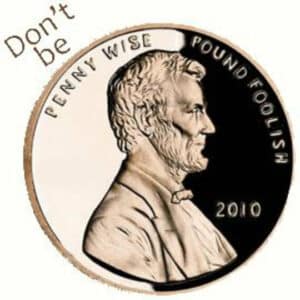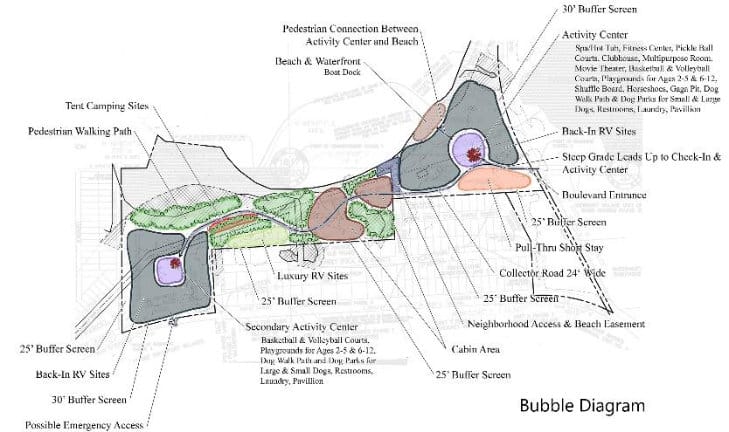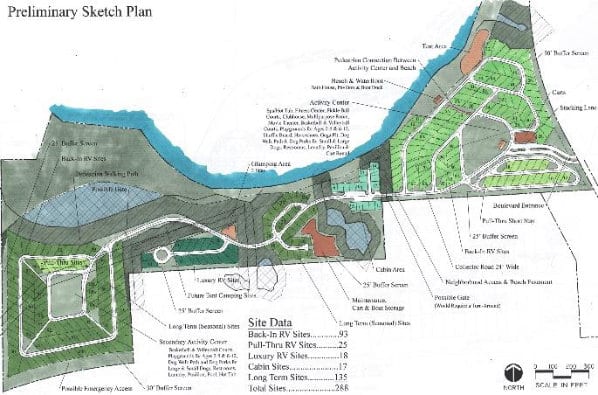
Written by: Don Westphal, Landscape Architect & Land Planner, Nadi Group, and Jayne Cohen, President, Campground Consulting Group LLC
Demand for modern campsites and RV sites has never been stronger. The growth in consumer interest in RVing and camping has resulted in the development of new RV parks and the expansion of established
campgrounds throughout the country at unprecedented highs. It is critical that a practical and prudent plan be developed before a shovel is put in the ground. Too many campground and RV park owners and developers have been penny wise for not seeking professional help or pound foolish for shopping for the most inexpensive professional services available. This mentality has resulted in a proposed expansion or development being rejected by planning and zoning, expansion or development not being the best it could be, the site density not being maximized to produce the highest revenue, building the wrong business model, paying higher construction costs, or by making costly mistakes and wasting time using inexperienced consultants and land planners or none at all.
This shortsighted behavior occurs at many stages in a project. Before plans are prepared, and applications are made, a trained expert in the camping and RV park industry can provide valuable guidance in determining the probable success or failure of a new RV park development or expansion.
New RV Park Development
A Market & Competitive Analysis determines the viability of the project and provides the client with an early risk assessment and market analysis for a proposed RV park development. This is the first step. The goal of the study is to provide developers with the guidance and knowledge to make future decisions concerning building an RV park on a specified property. This analysis answers such questions as to where the project will fit in the existing marketplace, what might be the most productive business model, what competitive factors should be considered, and the size, quality, facilities, and amenities recommended for the model. The report offers the developer expert recommendations on the business model leading to a go- or no-go decision to continue or discontinue RV park planning. The most valuable advice ever given is “Don’t do the project!”
Campground Expansion
Most campground owners, who are expanding, understand their market and what is needed. In some cases, expansion is geared towards new clientele and may require a particular level of market and rate analysis. Operational Audits completed prior to committing and investing in an expansion help ensure current sites are being used optimally. These audits are designed to fine tune day to day operations to improve guest satisfaction, revenue, and profitability.
Land Planning for new RV Park Development and Campground Expansion
Land planning starts with the land planner’s visit to the property or existing campground. Fitting the project or expansion into the natural terrain is especially important. A land planner, who specializes in RV park and campground planning, understands the challenges, and will incorporate natural topography into their plans. This allows for a more visually pleasing and environmentally sensitive plan and the developer will save the land planner’s fees many times over starting with the movement of the earth. It only takes a few hundred cubic yards of dirt moving savings to pay for a plan prepared by an industry expert land planner.
Following a site visit, the land planning research begins with the land planner reviewing surveys, topography maps, aerial photos, wetlands, amenities, and a facility/amenity wish list.
For a new development, this information is organized into a site analysis plan and bubble document
demonstrating the ideal arrangement of the project’s elements. The bubble diagram is now the basis for the hand-drawn sketch plan to follow.

The sketch plan is a free-hand or digital colored rendering that outlines circulation, campsites and open space patterns, location of the drainage facilities, recreation spaces, and facilities outlined in the project
wish list. It also identifies the expected unit numbers and densities of each site type. This sketch plan can be used for zoning and marketing. After the sketch plan is further refined, it will be produced in an Auto-cad format to be used by the local engineer in the approval and construction drawing phase.

During the zoning and approval phase, many projects are rejected because the proponents did not seek professional assistance to make a professional presentation. They failed to realize the real value of a capable and experienced professional who will properly prepare for the cumbersome process of many community approvals, attending hundreds of public meetings, and answering all the difficult questions raised by officials and the public. True professionals understand that if a project is not properly “marketed” to the local approval body, the project will never be marketed to the public. It is costly to hire an outside consultant for informal meetings early in the process to make the presentations at a public hearing. However, it is a fact that the value of a land parcel increases significantly when its designation is changed for a higher and better use.
A feasibility study is the last step in the initial planning stages. It is generally needed for financial institutions or investors who will be associated with financing the development of the park. This report incorporates the findings of the market analysis and sketch plan, as well as, operating recommendations and pre-opening marketing plans. A high-level review of local and state development regulations and ordinances will identify any health department and environment concerns. The financial planning segment includes rate setting, absorption, occupancy projections, ancillary recommendations, construction cost estimates, and a detailed Pro Forma Five Year projected operating analysis, statements, and return on investment analysis.
Clients benefit from an industry consultant who understands trends in site size, rates, ancillary recommendations, amenities, and facilities, as well as, industry best practices which are essential to the efficient design of new RV parks and expansion of campgrounds. In addition, sketch plans and marketing materials prepared by creative and knowledgeable industry professionals, as part of the planning and approval process, can inexpensively be adapted for use in the marketing of the RV park and campground expansion to the public.
Campground and RV park owners and developers who engage industry consultants to assist in the initial planning and as needed throughout the project, find it contributes significantly to the quality of the project and saves money, time, and aggravation. The right professional may be more costly initially, but the end results should pay their fees many times over.
In your next endeavor, will you skimp on the preliminary planning and be “Penny Wise and Pound Foolish” or will you seek capable and experienced professionals to produce a better, more cost effective, and attractive final project?
Campground Consulting Group LLC is the leading RV park and outdoor hospitality consulting firm with extensive knowledge and experience in park operations, expansion, development, and feasibility studies. Designs are provided by The Nadi Group, www.nadigroup.com, specialists in land planning and architecture, and the leading firm in campground and RV park design. For more information contact us or phone 800.897.8836.